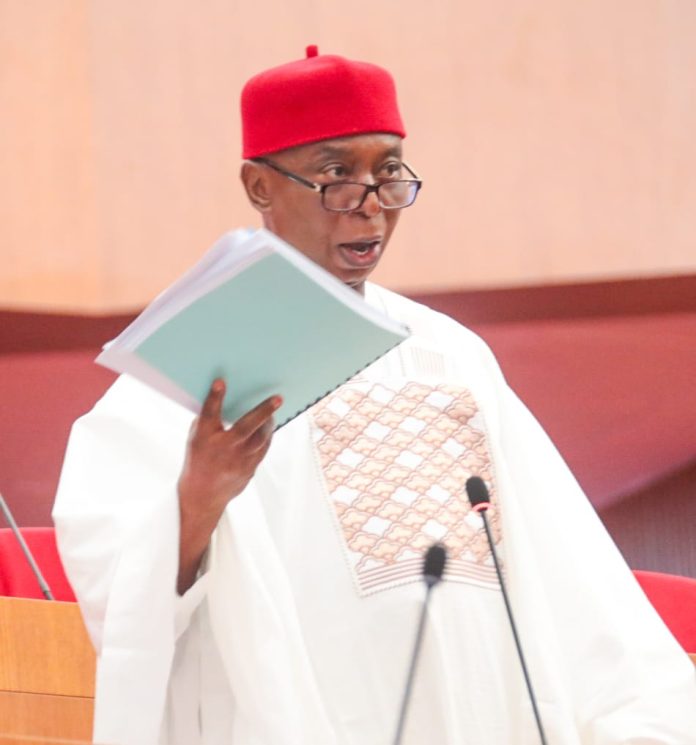By Austin Oyibode
The rise of social media has undeniably transformed communication, networking, and access to information. However, alongside these advancements, a troubling trend has emerged, an unchecked wave of misinformation and fake news.
One prominent figure who has felt the damaging effects of this phenomenon is Senator Ned Nwoko, a respected Nigerian businessman, philanthropist, and politician.
Despite his numerous contributions to Nigeria’s development, Senator Nwoko has repeatedly been targeted by false narratives, threatening his reputation and distracting from his commendable work.
As social media continues to grow in influence, it has become clear that both individuals and platforms must take responsibility to curb the spread of damaging falsehoods.
The Challenge of Fake News
Social media has given millions of people the power to create and share content, but this democratization of information comes with significant challenges.
Misinformation spreads rapidly, often designed to mislead, manipulate, or malign public figures. Senator Nwoko’s experience is a clear example of how viral rumors can distort reality and harm reputations.
Fabricated stories about his personal life and business dealings have circulated widely, often driven by political opponents or those seeking sensational headlines.
Such falsehoods not only damage his image but also distract from his genuine contributions to education, healthcare, and community development in Delta North and beyond.
A major concern with fake news is its speed—false narratives can reach millions within hours, while correcting them often takes far longer, leaving lasting scars on the reputation of those targeted.
The Impact on Public Figures and Society
For public figures like Senator Nwoko, the consequences of fake news are far-reaching. Having made his mark through philanthropic work and political advocacy, the spread of false stories undermines his efforts and diverts attention from his meaningful contributions.
Senator Nwoko’s support for educational initiatives, youth scholarships, and infrastructure development has positively impacted countless lives, especially in underserved communities. To fabricate stories that tarnish his legacy is not only unjust but a disservice to the nation.
Beyond personal harm, fake news also has a destabilizing effect on society. False narratives often use inflammatory language, provoking division, polarizing communities, and creating unnecessary tension. What starts as a smear campaign against one individual can escalate, threatening social cohesion and national unity.
The Responsibility of Social Media Platforms
While individuals spreading falsehoods must be held accountable, social media platforms bear a significant responsibility. As the primary channels for misinformation, these companies must do more to detect, flag, and prevent the spread of fake news.
Despite existing measures, enforcement remains inconsistent, and harmful stories often go viral before platforms can respond.
By the time a post is flagged or taken down, the damage is already done. This reality demands stronger investment in fact-checking technologies and partnerships with trusted organizations to swiftly correct misleading content.
Transparency and accountability from social media companies are crucial. Platforms must foster an environment where truth and accuracy take priority over sensationalism and clickbait.
Solutions to Stop the Spread of Fake News
Combating fake news requires collective action. Social media users must take personal responsibility, verifying information before sharing and cross-checking with reputable sources. Fact-checking websites and critical media literacy can play a significant role in curbing misinformation.
Governments and policymakers should also introduce stronger regulations, ensuring that false information does not thrive unchecked. Balancing freedom of speech with accountability is essential to safeguarding public trust.
A potential solution lies in one of Senator Nwoko’s proposed bills, advocating for social media platforms to establish offices in Nigeria.
Having a physical presence would streamline the resolution of issues arising from defamatory content, holding sensationalists accountable and ensuring a fair process for addressing reputational damage.
Time for Action
The spread of fake news is a growing crisis that demands immediate attention. The consequences, reputation damage, erosion of trust, and societal division, are too severe to ignore. Social media platforms and users must work together to create an environment where truth prevails over falsehood.
As Senator Nwoko and others have emphasized, it is time for social media users to stop spreading fake news and for society to actively protect the truth.
Those who deliberately spread falsehoods for personal gain must face justice, and Nigeria must foster a digital culture of honesty and responsibility.
By taking this stand, we can ensure that the digital age is not defined by misinformation, but by transparency, accountability, and respect for the truth.

















